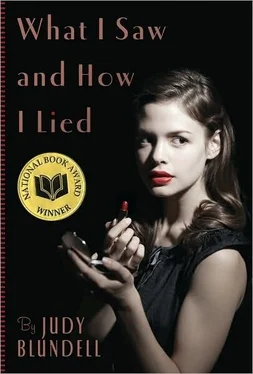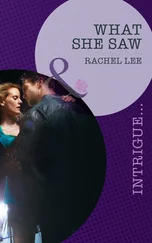She waited. I could feel her sympathy. After a while I felt her get up and search through her pockets, then go over to her work table. She came back and put a rag in my hands.
"It's clean," she said. "Barely."
I laughed, and she did, too. I wiped my face.
"Now, petal," she said. "Tell me why you came."
I told her about what Peter had told me, about the fortune in the warehouse, about how Joe got his money. About halfway through, she got up and went to the ledge just a few paces away. I got up and joined her and kept talking while we looked out at the city. It was easier to talk when she wasn't looking.
"So I took the money that's left, the eight thousand dollars," I said. "Gladys brought it down for a bribe, but she didn't need it. I want to give it to you."
Mrs. Grayson swiveled and looked at me.
"You must know people who need it," I continued. "That friend — that family friend you know who was in the camps. And he must know people, and they must know people, and they must need money because everything was taken from them, and they can start over ..."
"Evie, stop. I can't take this money."
"But you have to. It's the only way!"
"I can't take stolen money."
"It's nobody's money now. It's not Joe's. Would you rather he bought a house with it?"
"But it's not for me to say," Mrs. Grayson told me. "I'm not a judge, I'm not..." She waved her hands helplessly. "I'm not equipped for this."
"Then donate it somewhere. Just take it, because if you don't, we're doomed. The family. It's bad enough that I don't know," I said. "Don't you see, I don't know what happened on that boat. I don't know what kind of man Joe is. But I do know he did this one bad thing, at least. Peter said that somebody had to pay. Well, it can't be him. It just can't be. He might have been a thief and a liar and a cheat, but he was a good person."
Mrs. Grayson choked back a laugh. Then she stared down at the little suitcase, stared at it hard.
"I'll never tell Joe that I gave it to you," I said. "I promise."
"It's not that. What will he do to you?”
“Nothing. There's nothing he can do. He owes me too much."
Mrs. Grayson hugged herself, shaking her head helplessly.
"All the way back home, on the drive, I was thinking about penicillin," I said. "You know how they found it? The guy who found it was a slob. He kept his laboratory a mess, stuff everywhere — he'd leave it for weeks and months ... and one day he finds a mold. It was an accident. Out of this mess, this contamination, comes ..."
"Deliverance," Mrs. Grayson murmured.
"Deliverance," I said.
Back at home, it was time for Grandma Glad to get home from church. She would be walking up the stairs, holding on to the banister. She would go into her room and the first thing she would do was open the closet and look up at the shelf. I'd watched her do it yesterday — every time she came into her room she'd make sure it was there. Today, the shelf would be empty.
She would call for Joe, and he would come quick, alarmed at the tone in her voice. Mom would come, too, but they'd shut her out. Grandma Glad would talk about calling the police but Joe would say no. After maybe a minute or so, they'd think about me.
There would be hell to pay, but I was all right with that. I would pay that price. There was nothing they could do to me.
I swung down Forty-eighth and turned left on Sixth Avenue, heading away from my train. I felt light without the valise. I would walk for a while. The wind had kicked up, and it was blowing papers around like crazy. I looked down at my feet as I stepped on every crack. I didn't believe in bad omens anymore, or luck.
Dusk had fallen, and lights were coming on in all the apartments around me. Little squares of gold. I realized then that this was what Mrs. Grayson was painting, blue shadows and golden light. Behind every square of gold was a person. Maybe a family. How nice it must be to wake up and know so many busy lives were around you, in the humming hive of the city.
I felt something clear and straight inside me, and I knew I'd found home. I'd live here one day. I'd be in one of those golden squares of light. Around me would be a bunch of lives, some better, some worse. I'd be smack in the middle of all that living.
Joe would lose the money he'd counted on for his dream house. Mom and I weren't going anywhere. We would live in the house we hated, but that was okay, too, because maybe we were just getting a little bit of what we deserved.
What did I owe Peter? I knew the answer now. Something bigger than the truth. A little bit of justice — not for him, but for people he didn't even know.
During the war, whenever we had to give something up or put something off, we'd say it was "for the duration." Because we didn't know when the war would end, but we knew we'd stick with whatever we had to do.
So here I was. I would live with Joe and Mom. I had no place else to go. Joe would carve the roast on Sundays. He would put up the Christmas tree. They would hand me the phone, pick up my socks, leave the porch light on. I would never know what happened on the boat that day, but they would be my parents. For the duration.
But while I'd be their daughter, while I'd eat the roast and come home from dates and wash the dishes, I would also be myself. I would love my mother, but I would never want to be her again. I would never be what someone else wanted me to be. I would never laugh at a joke I didn't think was funny. I would never tell another lie. I would be the truth teller, starting today. That would probably be tough. But I was tougher.
Acknowledgment is way too genteel a word for the buckets of gush I want to dunk on the heads of those in my life who aided and abetted this book. First off, my amazing editor, David Levithan, truly a hunk of heaven, who took me to lunch and listened to a coming-of-age story involving blackmail, adultery, and possible homicide and said, "Cool!" Thank you, dear D, for your support and "perfect plumb" (look it up) over lo these many years. And a hunka burning love to everyone at Scholastic who liked this book and worked for it.
My cowgirl hat is hereby swept off in homage to my posse, Elizabeth Partridge, Julie Downing, and Katherine Tillotson, all of whom chase away blues and Mean Barbara like nobody's business. I am indebted to Donna Tauscher, as always, for her support, insight, and grace; to Jane Mason, gentle soul, fierce ally, and a friend forever; and to Meredith Ziemba, for sharing her stories, similes, art supplies, and whatever else she has in her truck at any given moment.
Every writer who tackles the historical past ends up standing on the shoulders of those who wrote insightfully about the period. I am especially indebted to Jan Morris for her fine book, Manhattan '45, and to Kevin Coyne for Marching Home. For those interested in the story of the Gold Train and the strange journey that ended in an army warehouse in Salzburg, there are numerous Web sites with historical documents to peruse. For a definitive history, I relied on The Gold Train, by Ronald W. Zweig. The excellent research department at the Palm Beach Post sent me exhaustive accounts of the 1947 hurricane. A tip of the hat to Sandy Simon's charming Remembering: A History of Florida's South Palm Beach County. Kelli Marin and Kathleen Holmes, experts in all things Florida, helped me out with hurricane holes. It was a lucky day when I stumbled on Barbara Holland's memoir, When All the World Was Young. Her prose is so crystal-perfect that I have a strong desire to put on a fetching hat and buy her a cocktail at some swanky hotel bar. A special thank-you to my parents for sharing newspapers and memories and photographs of their own journeys in the postwar years, as well as giving me all the support and love I could ever wish for.
Читать дальше












